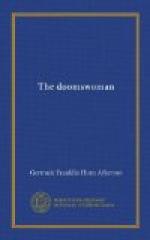XXII.
We spent the next day at the race-field. Many of the caballeros had brought their finest horses, and Reinaldo’s were famous. The vaqueros threw off their black glazed sombreros and black velvet jackets, wearing only the short black trousers laced with silver, a shirt of dazzling whiteness, a silk handkerchief twisted about the head, and huge spurs on their bare brown heels. Some of us stood on a platform, others remained on their horses; all were wild with excitement and screamed themselves hoarse. The great dark eyes of the girls flashed, their red mouths trembled with the flood of eager exclamations; the lace mantilla or flowered reboso fluttered against hot cheeks, to be torn off, perhaps, and waved in the enthusiasm of the moment. They forgot the men, and the men forgot them. Even Chonita was oblivious to all else for the hour. She was a famous horsewoman, and keenly alive to the enchantment of the race-field. The men bet their ranchos, whole caponeras of their finest horses, herds of cattle, their saddles and their jewels. Estenega won largely, and, as it happened, from Reinaldo particularly. Don Guillermo was rather pleased than otherwise, holding his son to be in need of further punishment; but Reinaldo was obliged to call upon all the courtesy of the Spaniard and all the falseness of his nature to help him remember that his enemy was his guest.
We went home to siesta and long gay supper, where the races were the only topic of conversation; then to dance and sing and flirt until midnight, the people in the booths as tireless as ourselves. Valencia’s attentions to Estenega were as conspicuous as usual, but he managed to devote most of his time to Chonita.
* * * * *
That night Chonita had a dream. She dreamed that she awoke without a soul. The sense of vacancy was awful, yet there was a singular undercurrent consciousness that no soul ever had been within her,—that it existed, but was yet to be found.
She arose, trembling, and opened her door. Santa Barbara was as quiet as all the world is in the chill last hours of night. She half expected to see something hover before her, a will-o’-the-wisp, alluring her over the rocky valleys and towering mountains until death gave her weary feet rest. She remembered vaguely that she had read legends of that purport.
But there was nothing,—not even the glow of a late cigarito or the flash of a falling star. Still she seemed to know where the soul awaited her. She closed her door softly and walked swiftly down the corridor, her bare feet making no sound on the boards. At a door on the opposite side she paused, shaking violently, but unable to pass it. She opened the door and went in. The room, like all the others in that time of festivity, had more occupants than was its wont; a bed was in each corner. The shutters and windows were open, the moonlight




